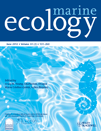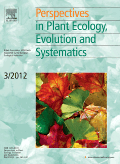
Frontiers in Ecology and Evolution
Scope & Guideline
Empowering discovery in the realms of ecology and evolutionary biology.
Introduction
Aims and Scopes
- Ecological Dynamics and Community Interactions:
Research on the interactions among species within ecosystems, including predator-prey dynamics, competition, and mutualism, as well as the impact of environmental changes on these relationships. - Evolutionary Mechanisms and Adaptations:
Studies exploring the evolutionary processes that drive species adaptation, speciation, and the genetic basis of phenotypic traits in response to environmental pressures. - Biodiversity Conservation and Management:
Research aimed at understanding biodiversity patterns and promoting effective conservation strategies, particularly in the context of habitat loss, climate change, and invasive species. - Ecological Modeling and Data Integration:
The application of modeling techniques and data integration approaches to predict ecological outcomes, assess ecosystem services, and inform conservation practices. - Human-Wildlife Interactions:
Studies focusing on the consequences of human activities on wildlife populations, including habitat modification, pollution, and climate change, as well as the development of management strategies to mitigate conflicts.
Trending and Emerging
- Climate Change Impacts and Adaptation Strategies:
An increasing number of studies are focusing on how climate change affects ecosystems and species, as well as exploring adaptive strategies that organisms employ to cope with changing environments. - Ecological Genomics and Evolutionary Biology:
The integration of genomic techniques to study evolutionary processes is on the rise, allowing for a deeper understanding of genetic diversity, adaptation, and the evolutionary history of various taxa. - Community-Based Conservation Initiatives:
Research emphasizing the role of local communities in biodiversity conservation is gaining traction, highlighting participatory approaches that engage stakeholders in conservation planning and management. - Microbial Ecology and Ecosystem Functioning:
A growing interest in the role of microorganisms in ecosystem processes and their interactions with plants and animals is emerging, reflecting an understanding of the critical contributions of microbial communities to ecosystem health. - Urban Ecology and Biodiversity:
The exploration of biodiversity in urban environments is increasingly relevant, with studies focusing on the impacts of urbanization on species interactions, community dynamics, and the potential for urban green spaces to support biodiversity.
Declining or Waning
- Traditional Laboratory-Based Studies:
There has been a noticeable decrease in studies relying solely on laboratory settings, as researchers increasingly favor field-based experiments and real-world applications to understand ecological and evolutionary dynamics. - Focus on Single Species Studies:
Research that concentrates on individual species without considering broader ecological contexts is becoming less prominent, as there is a growing emphasis on community ecology and interactions among multiple species. - Static Biodiversity Assessments:
The trend towards static assessments of biodiversity, without integrating dynamic factors such as climate change and habitat alteration, is waning in favor of more holistic approaches that consider temporal changes and ecological resilience.
Similar Journals

OECOLOGIA
Unraveling the Mysteries of Life Through Interdisciplinary ScienceOECOLOGIA is a prestigious journal dedicated to the interdisciplinary fields of ecology, evolution, behavior, and systematics, published by Springer. Established in 1968, this journal has consistently contributed to the scientific community, maintaining a strong impact factor reflected in its Q1 ranking within its category for 2023, and an impressive 79th percentile among 721 journals in the Scopus rank for Agricultural and Biological Sciences. With a commitment to advancing ecological knowledge and fostering innovative research, OECOLOGIA serves as a vital platform for researchers, professionals, and students exploring complex ecological dynamics and evolutionary processes. Although it does not offer open access, the journal remains dedicated to high-quality, peer-reviewed publications that inspire and inform the next generation of ecological science. For those interested in the latest trends and significant findings in biology and ecology, OECOLOGIA is an essential resource that continues to shape the discourse and understanding in these critical fields.

ANNALES ZOOLOGICI FENNICI
Illuminating the Dynamics of Animal ScienceANNALES ZOOLOGICI FENNICI, published by the Finnish Zoological Botanical Publishing Board, is a prominent scientific journal dedicated to advancing the fields of Animal Science, Zoology, Ecology, Evolution, Behavior, and Systematics. Based in Finland and serving an international audience, this journal has been an essential resource since its inception in 1974, offering valuable insights into biodiversity, conservation, and ecological dynamics. While it holds a respectable Q3 quartile ranking across several relevant categories in 2023, its impactful contributions to the scientific community continue to promote critical discussions and foster research collaborations. Although the journal is not currently open access, its robust indexing in Scopus and recognition within the academic community underscore its significance. As a researcher, professional, or student, engaging with the ANNALES ZOOLOGICI FENNICI not only enriches your knowledge but also aligns you with the forefront of zoological research and conservation studies.

Marine Ecology-An Evolutionary Perspective
Connecting Evolution and Ecosystem HealthMarine Ecology-An Evolutionary Perspective, published by WILEY, is a renowned journal dedicated to advancing the understanding of marine ecosystems through the lens of evolutionary biology. Established in 1980, the journal has firmly positioned itself as a vital resource in the field, currently boasting a 2023 Scopus rank of #337 in Ecology, Evolution, Behavior and Systematics and a Q2 category ranking in Ecology. With a focus on original research and reviews that encompass a broad spectrum of marine ecological studies, this journal critically examines the mechanisms driving marine biodiversity and ecosystem dynamics. Researchers, professionals, and students alike benefit from the journal’s comprehensive insights and robust analyses, which are pivotal for fostering ecological knowledge and informing conservation efforts. Although currently not an Open Access publication, the journal remains accessible through various academic platforms, inviting the scientific community to engage with its vital contributions to aquatic science and the evolutionary processes shaping our oceans. With an impressive trajectory that extends until 2024, Marine Ecology-An Evolutionary Perspective continues to set benchmarks in marine research.

PERSPECTIVES IN PLANT ECOLOGY EVOLUTION AND SYSTEMATICS
Cultivating Knowledge in Plant Systematics and EcologyPERSPECTIVES IN PLANT ECOLOGY, EVOLUTION AND SYSTEMATICS is a premier scientific journal published by Elsevier GmbH, dedicated to advancing knowledge and understanding in the fields of plant ecology, evolution, and systematics. With an impressive impact factor and a solid reputation within the top quartile (Q1) of both Ecology and Plant Science categories, this journal ranks among the elite, positioned 100th out of 721 journals in its field, reflecting its significant contribution to ongoing research and academic dialogue. Established in 1998 and converging through to 2024, this journal not only serves as a crucial platform for researchers, professionals, and students alike but also emphasizes innovative methodologies and interdisciplinary approaches to address pressing environmental issues. Although it follows a traditional access model, the wealth of rigorous peer-reviewed articles available will engage the scientific community and facilitate advancements in understanding plant diversity and ecological interactions.

ACTA OECOLOGICA-INTERNATIONAL JOURNAL OF ECOLOGY
Advancing Sustainability through Cutting-Edge ResearchACTA OECOLOGICA-INTERNATIONAL JOURNAL OF ECOLOGY, published by Elsevier, stands as a prominent platform for disseminating innovative research in the diverse field of ecology. Operating since 1983 and continuing to make significant contributions into 2024, this journal features critical studies that advance our understanding of ecological systems, behaviors, and conservation efforts. With an impressive Q2 ranking in both the ecology and nature conservation categories, it exemplifies high-quality scholarship, reflected in its Scopus rankings—#74 in Environmental Science and #254 in Agricultural and Biological Sciences. Researchers, professionals, and students in the field are invited to explore the latest findings and methodologies that address pivotal ecological issues. As a journal committed to fostering academic collaboration, ACTA OECOLOGICA is essential for anyone dedicated to enhancing their comprehension of ecological dynamics and advancing sustainability practices globally.

Annual Review of Ecology Evolution and Systematics
Unveiling Insights into Ecology and Evolutionary BiologyThe Annual Review of Ecology, Evolution, and Systematics, published by Annual Reviews, is a leading academic journal dedicated to advancing the understanding of ecological and evolutionary processes. With a commendable impact factor and impressive rankings—9th in both the Ecology, Evolution, Behavior and Systematics category and the Environmental Science category—this journal is recognized for its rigorous peer-reviewed articles that synthesize research findings across a wide range of topics within the fields of ecology and evolutionary biology. Established in 2003, this annual publication aims to provide researchers, professionals, and students with comprehensive insights into the latest developments and trends within these dynamic disciplines. By facilitating access to high-quality scholarly articles, the Annual Review of Ecology, Evolution, and Systematics continues to play a crucial role in fostering scientific discourse and discovery.

Journal of Vertebrate Biology
Exploring the depths of biodiversity and conservation.Journal of Vertebrate Biology, a reputable publication established by the Institute of Vertebrate Biology in the Czech Republic, serves as a vital platform for research across the fields of Animal Science and Zoology, Aquatic Science, and Ecology, Evolution, Behavior and Systematics. With its ISSN 2694-7684 and a commendable 2023 Q2 ranking in multiple categories, this open-access journal embraces innovative scientific inquiry and fosters academic discourse. The journal's commitment to disseminating high-quality research is reflected in its Scopus rankings, positioning it within the top quartile in several impactful areas. As it continues to converge its focus until 2024, researchers, professionals, and students alike are encouraged to engage with cutting-edge studies that advance our understanding of vertebrate biology. This publication stands out not only in its scholarly contributions but also in enhancing global awareness of biodiversity and conservation issues.

EVOLUTIONARY ECOLOGY
Unraveling the Dynamics of Ecosystems and EvolutionEVOLUTIONARY ECOLOGY is a prestigious academic journal published by SPRINGER, exploring the intricate relationships between evolutionary processes and ecological dynamics since its inception in 1987. As a key resource in the field of Ecology, Evolution, Behavior, and Systematics, the journal is recognized for its impactful contributions, holding a commendable Q2 quartile ranking in its category as of 2023. With an emphasis on empirical and theoretical studies that bridge evolutionary biology with ecological principles, EVOLUTIONARY ECOLOGY is essential for researchers, practitioners, and students aiming to deepen their understanding of biodiversity, adaptation, and ecosystem functioning. Although it currently does not offer open access, the journal maintains a commitment to disseminating high-quality research that influences both foundational knowledge and practical applications in the field. Located in the Netherlands, the journal continues to serve a global audience, making significant contributions to advancing ecological and evolutionary research through rigorous scientific discourse and innovation.

Biology Letters
Advancing biological knowledge through concise communication.Biology Letters, published by the esteemed Royal Society, stands at the forefront of research in the field of biological sciences, with a strong emphasis on innovative studies that bridge gaps across disciplines. Since its inception in 2005, the journal has garnered significant recognition, achieving a remarkable Q1 ranking in Agricultural and Biological Sciences (miscellaneous) and a percentile of 88th in the same category, according to Scopus rankings. Released in the United Kingdom, the journal offers a platform for authors to share concise research findings and theoretical perspectives that contribute meaningfully to the advancement of biological inquiry. Although not open access, the journal remains highly regarded in the academic community for its rigorous peer-review process and impactful content, making it an invaluable resource for researchers, professionals, and students dedicated to exploring the complexities of biology. With an ongoing commitment to excellence, Biology Letters continues to shape the future of biological sciences.

Theoretical Ecology
Unraveling complexities in ecological modeling and theory.Theoretical Ecology, published by SPRINGER HEIDELBERG, is a premier journal in the field of ecological modeling and theory, exemplifying the intersection of rigorous quantitative analysis and ecological understanding. With its ISSN 1874-1738 and E-ISSN 1874-1746, this journal has been a valuable resource for researchers since its inception in 2008, with a commitment to publish cutting-edge research until 2024. The journal's 2023 category quartiles demonstrate its impact, ranking Q3 in Ecological Modeling and Q2 in Ecology, reflecting its significance within the academic community. Furthermore, its Scopus rankings position it among the top tier of environmental science journals, ranking #181/461 in Ecology and #21/41 in Ecological Modeling. While the journal does not offer open access, it is an essential publication for those looking to deepen their understanding of theoretical frameworks that drive ecological research and practice. By providing a platform for innovative theories and models, Theoretical Ecology plays a crucial role in shaping future ecological studies and informing policy decisions in environmental management.